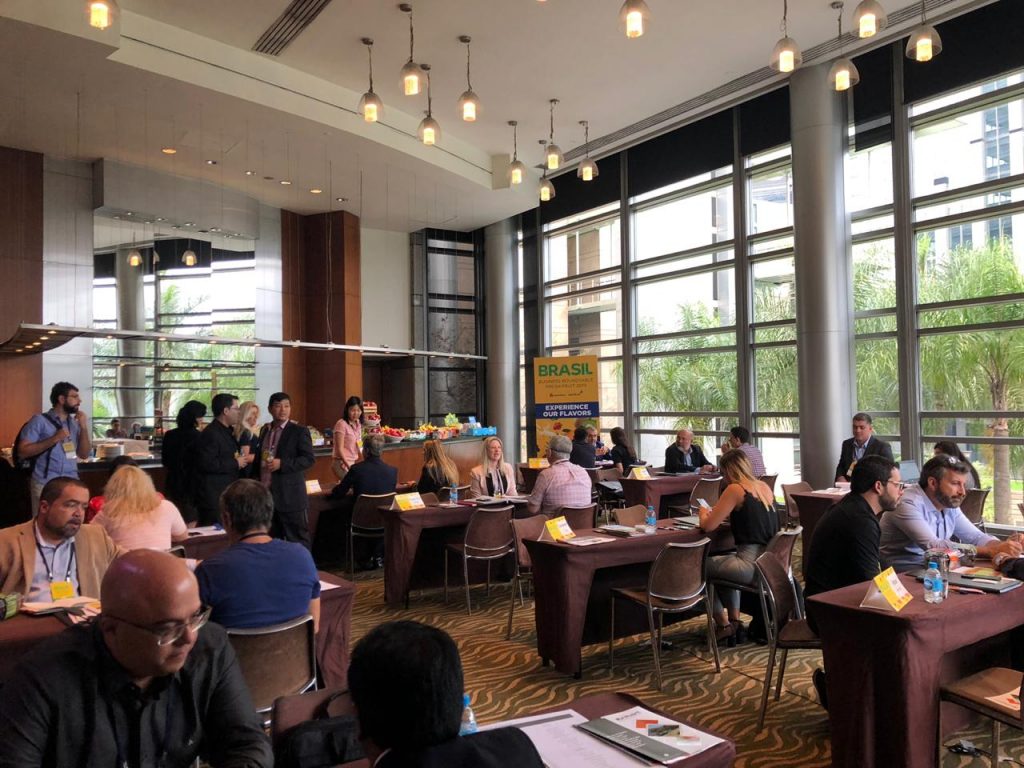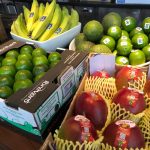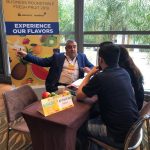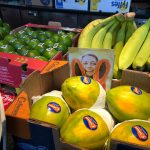São Paulo – Mangoes, lemons, avocados, bananas, apples, grapes and papayas were exhibited last Thursday (19) at the Fruit industry Buyers Project by Brazilian Trade and Investment Promotion Agency (Apex-Brasil) at an event room in Grand Hyatt hotel in São Paulo. Twenty-eight exporting companies that participated sell other fruits such as figs, oranges, lychees, melons, watermelons and persimmons. Sixteen buyers from thirteen countries participated in the B2B, including three Arab companies from Jordan, Lebanon and the United Arab Emirates.
Jordanian company Jabaly Agriculture brought representative Baher Mustafa. For the first time in Brazil, the fresh fruit and vegetable foreign trade manager said he’s optimistic with the connections he made. “It was an eye-opening event for the opportunities of Brazilian market. We visited farms and producers and have a logistic obstacle ahead of us, but we’ll probably sing a deal next month,” he says.
Before the B2Bs, Apex organized visits to two producer farms, Agrícola Famosa that grows melons and watermelons in Mossoró and Finoagro of mangos in Açu, both cities in the state of Rio Grande do Norte. All invited buyers participated in the visits and got to see the production process in the farms.
Mustafa says that Brazilian fruits are top-class products. “If the Jordanian public likes the fruits, we plan on transporting them by plane with Qatar Airways to Doha and then Aman,” he said. He told the company usually buys the product from South Africa and Europe and that the port logistics would be too complicated through Aman port since it would take around 30 to 35 days for the fruits to arrive.
It was also the first time All Fresh Sal CEO Rani Akiki from Lebanon comes to Brazil. Based in Beirut, the company buys fruits in the domestic market and Europe, especially Netherlands, and now intends to diversify. “We have a small production of mangos, avocados and grapes for around seven months per yeas in Lebanon on Beqaa Valley, and now we are thinking on buying from Brazil to complement the demand during the winter in the country.”
“It was a very rich event. We made a lot of connections and visited farms. They are huge states with large productions,” said Akiki. He intends to negotiate the freight with some Brazilian companies and soon start importing fruits like mangos, papayas and lemons with Emirates or Turkish airlines. “It’s more expensive, but the product arrives much fresher, since it would take around forty days by ship, which is not feasible for fruits,” he explained. “We’ll also assess the customs issue because we don’t have a free trade agreement with Brazil,” he pointed out.
(Story continues after photo gallery)
T.X. Borgio, the assistant general manager with the UAE’s Fit Fresh, accompanied Brazilian exporters who were taken to Dubai by Apex last July. Looking to make purchases, he has come to Brazil to follow through with his contacts with local companies.
Fit Fresh buys fresh fruit and vegetables to process into juices, sliced fruit, smoothies and salads. It supplies clients including Emirates airline. “We are concluding talks on products, prices and logistics, and we intend to buy orange, melon, watermelon and mango. We really enjoy the quality of Brazilian melon,” he said. The company buys fruit from companies like Australia, United States, South Africa, Egypt and Spain. “Brazil is systematically increasing its agricultural production and adopting hygiene and food safety processes, which is key for us. As far as what I could see, the farms do not use lots of agrochemicals, and whatever they use is allowed in our country,” he said.
The event is organized by Apex-Brasil in partnership with the Brazilian Fruit Growers-Exporters Association (Abrafrutas). Abrafrutas Projects director Jorge de Souza said the association helps with mobilizing Brazilian companies that either export or intend to do so.
According to Apex Agribusiness manager Igor Brandão, public-private sector support is important for deals to come to fruition. “We have a kind of public-private partnership with Abrafrutas, and the cost-benefit of having a schedule of visits and B2B events is very interesting, because it’s much cheaper than putting together a big stand at an international fair,” he said. According to him, the logistics and buyer profile when it comes to fresh items is more specific and different than for other food items.
“B2B meetings build more solid relationships between companies, and in the case of Arabs, they know that Brazil is strongly committed to sustainability and food safety, and that we’re a regular supplier that’s very well regarded internationally,” said Souza.
This is the third edition of the Apex Fruit Industry Buyers Project, and according to Brandão, it’s getting bigger every year, with more companies, more buyers and more countries involved. This year, prospective buyers have come from Italy, Ireland, Spain, Denmark, Slovakia, UK, Russia, UAE, Jordan, Lebanon, USA, Uruguay and Argentina. Some 350 meetings took place in one day, each lasting 20 minutes.
“Striking a deal right here is the exception rather than the rule, because this is the first contact – except for the companies that had been in touch before. The deals usually come about in the following months, and we’ll do this follow-up to find out about the developments from the event. We’ll get in touch with the participating companies to find out if they made any sales, what was the impact on the production process, adaptation of packaging and production processes, cost and logistics optimization, or adaptations in production. The companies become more mature as exporters by joining these B2B meetings,” concluded Brandão.
Translated by Guilherme Miranda & Gabriel Pomerancblum









